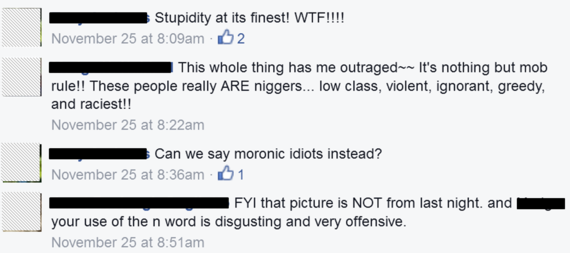Racism is alive and well in America, and social media has created a vehicle for people to express it.
Fortunately, it also enables people to fight it. I just stumbled upon a very effective weapon to use against the n-word. It makes a blunt but clear point: the n-word is offensive. If everyone responded with an immediate f-bomb to every utterance of the n-word, it would become obsolete.
I grew up in the lily-white suburb of Broomfield, Colorado. We didn't have a single African American family. One time as a teenager, some friends and I were caught stealing empty pop bottles from Safeway and then cashing them in for money. The police came and we ran. Getting ratted out by the one guy they nabbed would have been our greatest white-kid nightmare. He didn't, so we were safe from the worst thing the cops were likely to do to us: tell our parents.
Another time a couple of us bought fake guns at Crossroads Mall in Boulder. They looked like real revolvers. They shot special cap cartridges -- like blanks -- so they sounded pretty real to us, too. We staged gun fights and decided it would be funny to have a "duel" in the middle of the street in our town's business district, right in front of the Tastee-Freez. Nobody paid attention to us, let alone called the cops. Living in an ivory cocoon, we were oblivious to our white privilege.
I don't recall the n-word ever being uttered in my town. I didn't see Confederate flags or any other public show of overt racism. We weren't like that. "Society's Child" played on our transistor radios. I assumed that the reason my town was monochromatic was because black people just weren't interested in living there.
One day, we had a school assembly that was some kind of high-minded exchange with an inner-city Denver high school. A squad of African-American cheerleaders showed our girls some new moves. All was good, except some of my friends were making monkey noises during the routine. I didn't say anything. Nobody did. I didn't understand then that the refusal to confront racism is a tacit approval of it.
I moved away years ago, but Facebook enables me to stay in touch with old friends and acquaintances who still live in the area. Many of our conversations are politically-charged, and I'm often the only one taking a moderate position (which has earned me the reputation of being "liberal").
The day after the grand jury decision in Ferguson, one friend posted a picture of black rioters with the caption, "LOOTING Because nothing says you care about a dead kid and the community more than stealing 50 pair of Air Jordans and burning the store to the ground!"
The second comment came from a woman who called Furguson protesters "...low class, ignorant, greedy, and raceist!! (sic)." She also used the n-word.
My sister quickly called out the comment as disgusting and offensive. Four hours and 40 comments later, nobody else had spoken up.
This time I had the opportunity to challenge racism and I did. I told my friend that the n-word shouldn't be used in civilized conversation and asked him to delete the comment.
He defended the offender as an old friend of a earlier generation who was only talking about the "bad apples"
Another former classmate immediately took umbrage at my suggestion, saying "[She] can say whatever she damn well wants to, I find the call to censor someone more offensive than the use of an offensive word."
After several more comments discussing the rights of people to use offensive language, my friend explained his reasoning, "I don't agree with her using it but she is a friend and I will defend her freedom of speech regardless."
To that I replied that since I was his friend too, he must also be willing to defend my right to call her a "racist bitch."
That fired up the peanut gallery. The next comment came from a guy who earlier had referred to a TV newswoman as an "anchorskank." Now he said, "Isn't using bitch sexist? so you're telling ME that using sexist terms is acceptable to you."
That's when I dropped the f-bomb, "In that case, she's a racist [expletive expletive]. Better?" (where the first expletive was the adjective form of f-bomb and the second was a gender-neutral term for an orifice that everyone has).
The immediate response was "OMG" from someone who had said nothing after the n-word comment (in her defense, she may not have seen it before it scrolled off the page).
This reaction exceeded my expectations. When the n-word is used, the reply should not be nuanced or politically correct. The n-word needs to be carpet-bombed into oblivion.
My friend swiftly deleted all my comments and "defriended" me, telling me that I'm rude and that I just like to argue.
The objection to my use of the f-bomb was nearly universal among the participants in that Facebook thread -- people I knew in high school. The n-word comment was still there the last time I checked, at the end of the week. Nobody else objected to it and it was never deleted. It is hard for me to accept the fact that my hometown has spawned a generation of racists.
The originator of the thread is someone I've known for more than 50 years, through neighborhood adventures, swimming, Boy Scouts, high school football, and late-night Risk parties. He now has declared that our lifelong friendship is over.
My definition of friendship is different.
Friends don't let friends be racist.

